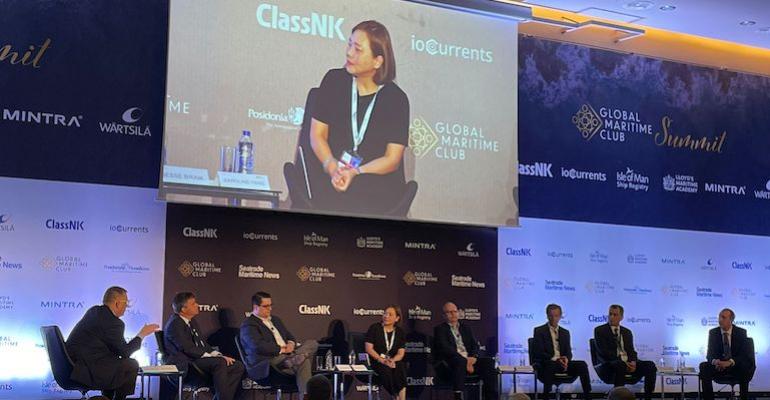Panellists on the “Digitalisation Demystified” session of the Global Maritime Club Summit 2022 grappled with how to utilise digital technology in a way that is beneficial for shipwowners and managers, and how to develop systems and applications relevant to the industry.
Inmarsat President Ben Palmer OBE brought an outside perspective from the defence sector where he previously worked and focused on driving innovation that creates value. “It seems to me we’re kind of in the battle of idea space, and we want to encourage that, because out of that will come value. Innovation is about connecting ideas and deriving value and I think we’ve got to get more efficient and getting from the battle ideas to the collaboration—that’s actually going to drive material change in value,” he said.
The topic of providing solutions that add material value was also touched on by Caroline Yang, Chief Executive of Hong Lam Marine and President of the Singapore Shipping Association (SSA), in relation to start-ups. “We must encourage start-ups and we do that in Singapore, there is really a push by the government as well as the industry. The solutions that they come up with they have to work very closely with industry, the problem statements must come from the industry, I think that is important,” she said.
Those start-ups that successfully add value will be the ones that survive for the long term. “At some point in time there will have to be some rationalisation of the different start-ups and some will fall by the wayside. Hopefully we do some rationalisation and [build] a more coherent system of solutions,” she said.
Palmer saw a need for a new, collaborative eco-system. “I just sense we need to find a new eco-system, a new collaboration that allows people with real use cases—from which they can derive value from transformational change—ways of doing things, and get this suite of things we actually want to go out and prosecute as that will drive adoption, that will drive value and new extensions.”
As to what value technology can add to the industry this topic was addressed by a several panellists covering a range of areas from decarbonisation to maintenance.
Mark Warner, Director of Marketing for Lloyd’s Register, likened the transition to that with fuels, and the move from sending Noon Reports, to maintenance reports, to real time frequency data and analysis of that data to produce outcomes to be acted upon. “You are going to have fleet optimisation, but what are the measures? What are you going to be putting onboard? Is it air lubrication systems and understanding that, but more importantly what is the payback on that? That again is where you need the digital solutions – you need to be monitoring them all the time,” he explained.
Jesse Brink, Chief Executive Officer of io.Currents said they view the vessel as giant floating data centre, however, not much has been done with that data. To do this a baseline of performance of the vessel today needs to be established so performance can be tracked and improved. For example, he said: “What does that vessel behave like today? And then to continually track where your technical performance degradations and an that’s an area to focus on optimisation for maintenance.”
V.Group Chief Information Officer, Stephen McFarlane, set out a vision for an industry 4.0. “We will be on a journey and at some point in time we will stop sending ships around the world in ballast to pick-up voyages, we’ll stop anchoring ships in ports for 28 days because we’ll all be in a common digital eco-system and we’ll actually know when we’re picking up the cargo, which makes the most economic sense and delivering it to the right place at the right time.”
However, he noted the industry was not there yet, indeed current port delays were the worst ever seen. “But that’s the journey this industry will go on, because if we don’t go on that journey we will never meet the requirements around decarbonisation.”
The continuous nature of digitalisation will also lead to a shift in how software is acquiring with it becoming a service rather than a one-time acquisition.
Sean Fernbank, President of Wartsila Voyage, said: “You’re moving from less of a capex model to an opex model. Software isn’t something you do once, it’s something you invest in continually. I’ll use cyber security as an example. Cyber is going to get harder and need continuous investment and improvement to make sure that our connectivity and services we provide on the vessel and onshore are secure and we don’t have any nasty incidents.”
Copyright © 2024. All rights reserved. Seatrade, a trading name of Informa Markets (UK) Limited.
Add Seatrade Maritime News to your Google News feed.  |

